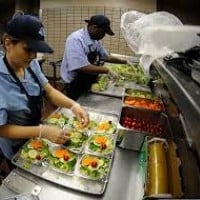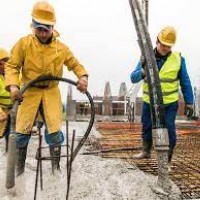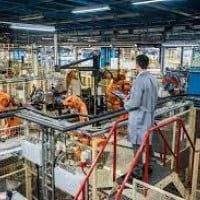Top 10 Occupations That Were Most Affected by the COVID-19 Pandemic
COVID-19 has hit everyone really bad, and it would be hard to find anyone who hasn't been affected slightly by what's going on. Everyone has heard of the horrible effects and high death toll of it, and everyone knows how everyone's been shut down to avoid getting the virus, but a slightly overlooked yet just as bad part of the Pandemic is the effects it's had on many workers, companies, and on the economy. Many, many people have been laid off due to not enough business or income for the company, and, in contrast, some jobs have had to work overtime to deal with the virus itself, or have even thrived during the pandemic. So, here are the Top Ten Occupations that were most affected by the COVID-19 Pandemic.
Healthcare Workers are basically just anybody working at a health care organization, whether a doctor, nurse, or just a staff member there. Healthcare Workers were severely affected by the COVID-19 pandemic, and not for the same reasons as most of the other items on here. While almost all other jobs ended up having to be working from home, and in other cases actually laying off many of the staff, Healthcare Workers have been working overtime to manage the already enormous workload they had as well as following the COVID-19 protocol such as wearing a mask and staying socially distanced all while being the occupation that has to deal with COVID-19 itself and with helping patients who've gotten the virus survive. And it's not only lots of extra work. COVID-19 has overwhelmed the capacity of healthcare and its resources as well as significantly changing the rules that Healthcare Workers have to follow. There are lots of shortages of drugs and life saving equipment, both because Healthcare Workers have to use them overtime and because, due to COVID-19, it's much harder to get that equipment to people. Without a doubt, Healthcare Workers have been severely affected by COVID-19 and we have to thank them for all that they've done during the pandemic.

You may be wondering, what does it mean, to be a service worker? Basically, it's a category including jobs like Food Servers, Security Guards, and Janitors - generally jobs that involve doing stuff on site and with lots of interaction. Unlike Healthcare Workers, Service Workers were impacted in quite a different way. Many of them weren't needed or were too hard to pay with the lockdown going on, and over 34% of Service Workers were actually laid off, far more than in any other job category. Additionally, over 43% of Service Workers were reduced pay, and over 44% of them were reduced hours. What's even worse is that it's hard to find a new job after you've been laid off during the pandemic, so many of these people may not get a job for years after being laid off, which could severely affect their personal life.

This category basically means anyone who works on the entertainment division (on theatre), including all the set designers and all of the people essential to make your favourite plays and movies, as well as other people who work on making art, interior designers, and all those related jobs. It's very tough to do performances for an audience that doesn't exist, and filming's is hard to do during the COVID-19 pandemic so the production of movies has gone down quite a bit as well, and the demand for pretty much anything involved in this category has gone down a lot, so lots of the people here basically have nothing to do, at least until the end of the pandemic. As a result, a whopping 48% have been reduced pay, 27% were reduced hours, and 25% were laid off, so about three quarters of the people working here have either been laid off or had their income reduced, which is insane.

As I'm sure you all know, people under this category are the people whose jobs have something to do with building homes and other foundations, whether it's as the actual construction workers or more behind-the-scenes people like the building inspectors. These people are essential and generally still running during the pandemic, but unfortunately many of them have been laid off or at least reduced pay and hours during the pandemic. Over 18% have been laid off, and over 38% have been reduced pay, which means that over 50% were affected in some way. What's been the worst for them is the lack of demand for big, nonresidential buildings. They're still getting lots of opportunities to build homes, but as many big corporations have switched to just working from home, they don't need these big buildings anymore, which has caused many to be laid off or reduced pay.

This means all of the people involved in the mining, oil, and gas extraction industry. As barely anyone's driving these days and nobody needs gas for their cars, the need for gas has gone down by so much that the gas that's normally produced from mining has nowhere to go. As a result, many people have been laid off as there's nothing for them to do. Additionally, mining is one of those jobs that requires people to be on-site and working away from homes, and when the COVID-19 pandemic forced all these people to go home, well, there's nothing for them to do there, so most were reduced pay at the very least. The Mining industry heavily depends on stable and predictable market conditions and functioning supply chains, and COVID-19 has undermined that so much that they really can't work anymore.

Most to practically all industries have been impacted in a negative manner by COVID-19, but Online Course Instructors, which means pretty much everybody involved in giving online courses, from workouts to book clubs to practically anything you can sign up for over Zoom (obviously, not including school teachers). They've done extremely well throughout the pandemic with everyone working at home and in dire need of an online course to keep them occupied. Online workouts have been very popular for people who don't go to the gym anymore, and many clubs that were normally in-person have been adapted to online courses for the pandemic alone. It's extraordinary how well this job has done throughout the pandemic.

Personal Service Workers are those people who usually come to your house to help you with things you need to get done, from dry-cleaning and laundry to repairs on your house to even babysitters. With everyone working from home and it really being unnecessary to have people come in to help you with things you can really do yourself when you're at home, the need for this has dropped by an incredible amount. Hundreds of thousands of people from this occupation were laid off in 2020 alone, which is an enormous amount. Unfortunately, it's unlikely that people will really need these workers after COVID-19's over as they've realized that they can really do all the things that these jobs offer themselves, so this occupation may never really recover.

These people are the ones who help directly produce us food, clothing, or other goods, usually in a factory or other workspace like that. Farming isn't included in this category. But Manufacturing Workers have been very impacted by the COVID-19 pandemic due to the fact that their jobs usually involve employees to work side-by-side, which is basically impossible when you want to practice socially distancing, so this occupation was completely changed and very man employees were laid off. The biggest impact COVID-19's had on this industry was on the clothing industry. The need for new, stylish clothes, or even new clothes at all, especially when pretty much just staying at home, has gone down so much that so many people had to leave the industry.

One of the most trending and surprisingly thriving jobs throughout the COVID-19 Pandemic is developers. With COVID-19 keeping everyone indoors (for the most part), people have been going online more than ever, and as a result, the demand for developers, which means the people who work to keep all the digital platforms and apps running smoothly, has gone up by an insane amount. While almost all occupations have been affected in a negative way by this virus and the pandemic it brought to light, a few jobs have actually done very well, and developers have improved so drastically they had to be this high on here.

Transportation Workers, which means anyone who works on transport, whether as a pilot or as a taxi driver, were very much impacted by COVID-19, because nobody's really going anywhere during the pandemic. When was the last time you went on a plane? Probably not since early 2020 at the very least! As a result of extreme reduction in demand for transportation workers, a whopping 50%, which is literally half, were reduced pay, as well as 46% getting reduced hours and 17% being laid off. If things don't brighten up soon then these already huge numbers of reduced pay and hours will grow and so many more will be laid off.
I didn't add this item but it actually makes sense.

At first things were looking good for the fast foods, but eventually when you see the unemployment number up as an ascending Updated: 9.3% looks haunting. Definitely can see the lingering effects of some of these businesses nearby my area. Restaurants not having enough help in place. Wait an hour for a table. It makes things hard to keep your customers happy knowing the impatience some will have for hunger on a given weekend in this case, or weekday. This would mean immediate hires in desperate need to stay open. The majority of the fast foods had cut their hours and had not served breakfast. The only solution if I'm being honest is to cut off the stimulus benefits. This really hurts the economy in another form. It's hard to support your favorite place to eat if there struggling in serious dying times to stay open.